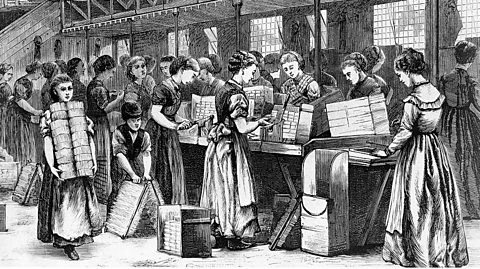Humans put a lot of stock in numbers. Our need to divide items into handy sections of equal length is based on many things.
For a start, thereās the 365-and-a-quarter days it takes the Earth to orbit the sun. Then thereās the 24 hours that make up those days and the 60 minutes and seconds which fill each and every one of those hours.
But the seven days which make up the week? Its roots are said to lie in the Babylon of 4,000 years ago, when the seven planets believed to make up the solar system made the number so sacred, it dictated the Babyloniansā days. The concept then worked its way through the Middle East and into Europe.
But that was a week. No mention of weekends. It took the industrial revolution, faith and workersā rights to make those happen.
Saint Monday
In 19th-century Britain, Sundays were a holy day, and nobody was expected to work. This was a noble concept for anyone who spent their free time pursuing spiritual matters, but those who took advantage of an opportunity to kick their heels up and live the high life for 24 hours, found being perky for work on Monday mornings a bit of a problem.

Not turning up for work on a Monday became a bit of a tradition for some workers. Thus the concept of 'keeping Saint Monday' came to be.
There was nothing remotely religious about it, although there must have been many a soul waking up with a sore head at the supposed start of the working week who gave thanks for it.
Productivity suffered as a result of Saint Monday, to the extent that factory owners decided to make Saturday a half-day instead. This would ensure workers arrived on Mondays with clear heads and increased enthusiasm.
It seemed to work, so three-quarters of the weekend as we know it was born.

The full 48 hours
Sunday is a holy day for Christians but this traditional day off didnāt acknowledge the many Jewish workers in factories for whom Saturday was the Shabbat, or Sabbath. This begins at nightfall on Friday, running through to nightfall on Saturday, and is the most sacred time of the week.
The first change regarding the Jewish day of rest happened in America in 1908. A mill in New England allowed a two-day weekend so that its Jewish staff could observe the Sabbath. This was a hit with workers and led other industries nearby to introduce a five-day week too.
Henry Ford, the legendary car maker, made Saturday and Sunday days off for his staff as early as 1926 and he was also keen to set down a 40-hour working week. An altruistic move in part, it also gave his workers the opportunity to spend their down time buying consumer products, keeping cash circulating through the economy.
The USA officially adopted the five-day system in 1932, in a bid to counter the unemployment caused by the Great Depression.
At around the same time, something similar was happening on the other side of the Atlantic.

A very British weekend
In 1933, John Boot, chairman of the Boots corporation, faced a working environment where it was not uncommon for workers to be made redundant, something he was keen to put an end to.
A factory opened in Nottingham that same year which was intended to increase efficiency. It did, in that it produced so much stock there was a surplus, putting peopleās jobs at risk.

The solution was to close the factory on Saturdays and Sundays (staff usually worked Saturday mornings too) but keep the same number of workers on the same pay. The reduced hours meant there was less chance of a surplus and Mr Boot had a workforce which showed up ready and invigorated on Monday mornings after having more time for leisure and family activities.
Further study showed that two days off each week reduced absenteeism and had a positive effect on productivity. The weekend was therefore made official Boots policy in 1934.
Could the weekend be longer?
Ever since the 1960s, there has been talk of the weekend being extended to make it almost as long as the working week. Three or four day weeks have been a dream for many who believe advances in technology make it possible for people to complete their required work in a shorter time.

A firm in New Zealand tested the theory by reducing the working week to four days but still paying staff the wages for five. Twenty-four percent of staff later reported an improvement in their work-life balance. Seven per cent said stress levels dropped and there was no negative effect on productivity. However, one US company switched back to a 40-hour week after a similar trial.
When faced with cutting back staff, it was thought inappropriate to have some working on a cushier four-day contract while their colleagues were being made redundant. The idea was also abandoned by a firm in Sweden when extra staff had to be taken on to account for the fewer hours the existing employees were working.
It sounds as though that Friday feeling isnāt going to become the Thursday thrill for a long time yet, and weāre certainly stuck with the Monday blues.
This article was published in July 2019
What would carbon neutrality mean for the UK?
A future of quieter roads and more holidays by rail could be on the cards.

Lia: crĆØche assistant. document
Lia works in the crĆØche at a leisure centre.

Five movies that get dating wrong
Hollywood has a long and proud history of peddling clichƩs about romance.
